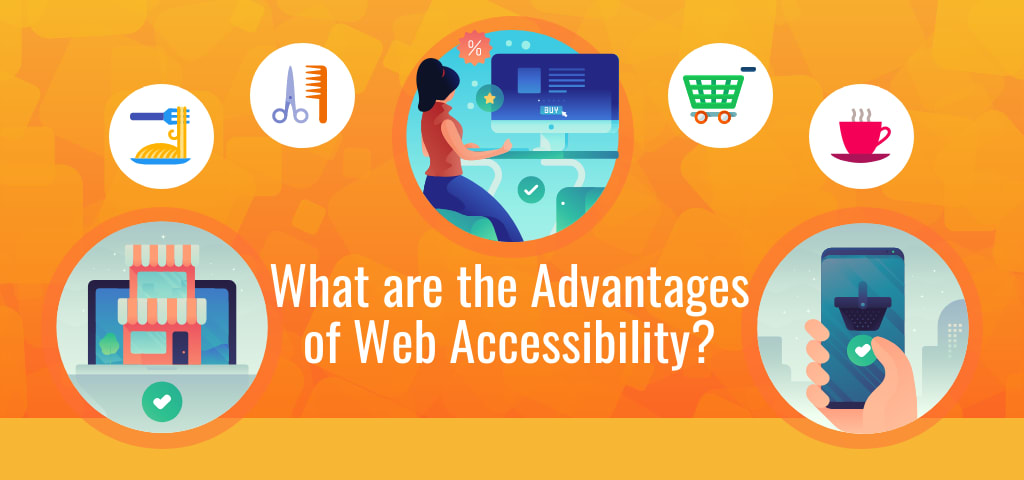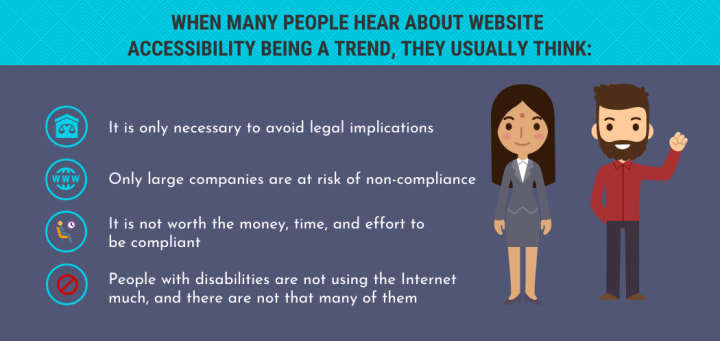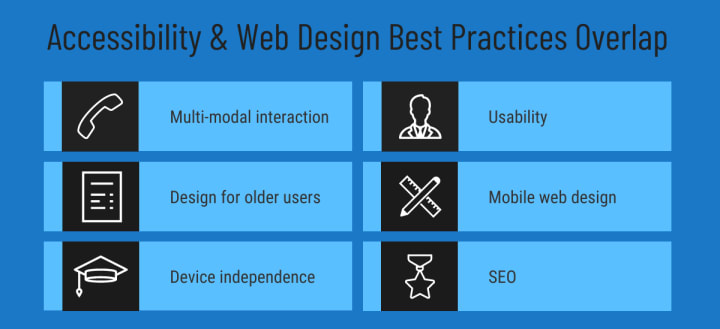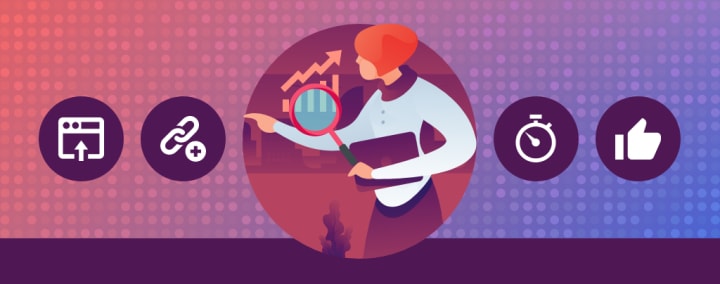What are the Advantages of Web Accessibility for Your Business?
Grow your business by improving website accessibility

Your website is your online business representation of what you offer potential customers or clients. Make sure that all visitors can access and use it successfully.
Just as laws protect the civil rights of disabled persons for homes, parks, businesses, and educational facilities, the Web Content Accessibility Guidelines (WCAG) requires websites to be accessible to everyone.
According to the CDC, 61 million adults in the United States live with some type of disability, including hearing and visual impairments that affect how they interact with your website.
What is Web Accessibility?
A website properly coded and designed enables everyone, including those with disabilities, to access and use it.
Not only is it the right thing to do, but it also brings benefits to all users. Some accessibility features for the disabled help others as well.
For example, videos with captions for the hearing impaired are also useful to anyone viewing a muted video.
Web accessibility provides the same access to the disabled as anyone else. Even people with cognitive, vision, hearing, and motor conditions should be able to use and navigate your site.
However, when many people hear about website accessibility being a growing trend, they usually think:
• It is only necessary to avoid legal implications
• Only large companies are at risk of non-compliance
• It is not worth the money, time, and effort to be compliant
• People with disabilities are not using the Internet much, and there are not that many of them

All four of the above assumptions are incorrect. The disability market is growing, and their discretionary spending power is comparable to other markets.
The disabled population consists of people with cognitive, vision, mobility, hearing, and other impairments that could prevent them from accessing your website, making a purchase, and becoming a loyal customer.
According to the American Institute for Research's 2018 report, disabled working-age individuals' disposable income was $21 billion.
That is a lot of buying power. Below are several advantages and reasons why website accessibility is smart business.
Reach a Wider Market
When your website is accessible to all users, you are broadening your market penetration by tapping into a market you might have been missing.
In turn, this will increase the number of people that visit your website, which can lead to more sales. For example, adding transcripts and closed captions enables the hearing-impaired to see your message.
Not only does making your website accessible benefit the disabled, but it also helps the large percentage of the population with similar problems.
For example, many in the aging population experience arthritis, shaky hands, and vision problems like the disabled.
Improve Public Relations
We live in an era of social and digital activism. Consumers support companies that share their values, beliefs, and ideals.
In a study by Accenture Strategy, 62% of consumers prefer to buy from brands that take a stand on important issues.
People with disabilities and those who love them will appreciate your supporting web accessibility.
When your website makes it easy for anyone to navigate or interact, it helps to build a positive brand image and increases loyalty.
Satisfied customers, with or without disabilities, are more likely to recommend your company to family and friends.
Increase Usability
Accessible websites ensure that all potential users, including the disabled, have a positive user experience when interacting with your site.
The goal of accessible websites is to ensure that people with disabilities can easily access your products or services in any environment.
There is an overlap between accessibility and other best web design practices, such as:
• Multi-modal interaction
• Usability
• Design for older users
• Mobile web design
• Device independence
• SEO

Accessibility best practices improve your website usability for all users. This results in reduced maintenance costs, increased audience reach, and better search results.
Improve SEO
Having an accessible website not only makes it suitable for anyone to use, but it also increases the chances of being found in search.
A critical factor for determining SEO status is user experience. The better the experience, the more time a user spends on your site.
The goals of SEO and web accessibility are aligned in many cases. For example, websites with easy navigation and a clean interface help people with disabilities.
Simultaneously, the more time users spend on your site, the lower the bounce rate and the more likely they will return to visit again.
Optimizing your website for accessibility includes many SEO best practices, such as descriptive links, alt-image tags, captions, semantic code, and title tags.

By following web accessibility best practices, you are also improving your SEO.
Avoid Legal Complications
In addition to providing a positive experience for all users, having an accessible website also helps you avoid financial penalties for non-compliance.
The Americans with Disability Act (ADA) requires all public and private places such as schools, restaurants, and office buildings, to provide equal and easy access to people with disabilities.
While digital technologies and the Internet are becoming more prevalent in everyone's life, it is understandable that web accessibility is considered a civil right for the disabled.
Although the ADA does not yet explicitly address web accessibility, the legislation is broad and can be interpreted to extend into the digital arena.
Achieving full ADA compliance (title iii) is best done via implementation of the WCAG guidelines when it comes to federal law.
The number of lawsuits regarding inaccessible websites is increasing with more than 2,200 cases filed in 2018.
Recent high-profile cases, such as Beyonce's Parkwood Entertainment lawsuit, have increased awareness and visibility of web accessibility.
Businesses should work to implement web accessibility standards to avoid discrimination claims.
How to Make Your Website Accessible
The best way to make sure your website is totally accessible would be to:
• Hire an expert to fix any problems
• Keep abreast of law changes around the world and be sure to implement them
• Manually test all types of access challenges
While you likely do not have available resources to manually make your site totally accessible, you can work on making improvements by following web accessibility best practices, such as:
• Use alt text for images
• Provide podcast transcripts
• Choose appropriate text sizes and fonts
• Include captioning for videos on your site
• Allow users to skip navigation by including it as a feature
• Use colors with sufficient contrast
But the fastest, easiest way to make your site accessible is to use automated accessibility platform such as accessiBe if you lack the funds and time to hire a dedicated coder.
Grow Your Business by Improving Website Accessibility
Web accessibility benefits more than just the disabled. Being compliant improves your brand image, expands your customer base, increases search engine rankings, and improves usability.
The positive effects on your bottom line can not be understated. Your business goals must always meet your customers' needs.
Your commitment to web accessibility shows that you care about your potential target audience and are making a concerted effort to take actions on their behalf.
About the Creator
Julie Weishaar
Julie works to grow small businesses, increasing their online visibility by leveraging the latest in internet & video technologies. She specializes in animated video production, custom images, content writing, and SlideShare presentations.






Comments
There are no comments for this story
Be the first to respond and start the conversation.